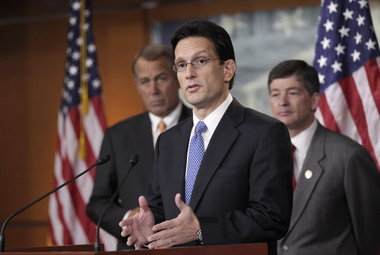By Frank Knapp Jr.
Congress is considering a proposal that portends to offer commonsense rules to affect how federal agencies analyze costs and benefits. Instead, it will be disastrous to taxpayers, small and mid-sized businesses and the country as a whole.
The Regulatory Accountability Act of 2011, which passed in the U.S. House, provides extensively detailed procedures for agencies in promulgating regulations that are projected to have a minimum effect of at least $100 million on the U.S. economy.
However, a thorough reading of the proposal leads to three conclusions. First, it will likely drive up the cost of almost every rule-making process and budget of a federal agency. Second, federally elected officials will be stripped of their ability to responsibly lead our country. And third, it's a highway to never-ending lawsuits by special interests against the federal government.
The RAE is designed to micromanage every federal agency in its efforts to create rules necessary to carry out legislation passed by Congress. By doing so, it turns over 60 years of effective regulation promulgation under the Administration Procedures Act into a protracted process that will stretch the time needed for rule-making into decades. Federal agency budgets will need to be expanded by hundreds of billions of dollars to comply with the RAA and perform their usual functions of protecting the public and small businesses from unsafe products and practices.
Congressional and presidential governance will be replaced by bureaucratic decisions designed to appease special interests. Elected leaders will be turned into figureheads whose every effort to exercise the will of the voters will be thwarted by the will of government bureaucrats, special interests and the courts.
Finally, the proposal is a corporate lobbyist dream. It appears to have been written by corporate attorneys for corporate attorneys.
Every aspect of the RAA is geared toward encouraging special interests to legally challenge every regulation of an agency. Even frivolous lawsuits are protected because it defines "substantial evidence" for a lawsuit to be anything the special interest thinks is "reasonable."
The 32-page RAA mentions judicial review, litigation, the court and other lawsuit terminology 18 times. It even includes a provision guaranteeing "immediate judicial review" for any special interest on every aspect of the prescribed rule-making process. Even the decision by an agency that a rule will not meet the minimum $100 million threshold can be challenged in court, making the development of any rule subject to the extensive and expensive rule-making process. There is no way to describe the RAA in any other simpler terms than to call it what it is -- a budget-busting, anti-democracy, Corporate Attorneys Full Employment Act.
It's no wonder, then, that supporters of the RAA are primarily U.S.-based multinational corporations. Increasing the cost of government for taxpayers is not a concern to these corporations that use offshore tax havens and other deceptive accounting practices to avoid paying their fair share of U.S. taxes. If federal agency budgets must be increased because of the RAA, it won't be the multinationals footing the bill.
The multinationals have no allegiance to government and democracy. Their shareholders and corporate executives are the only flags they salute. A diminishing of our democratic governance only serves to give the multinationals more power. The only authorities these multinationals recognize are the courts. With their enormous wealth, multinationals eagerly pay expensive corporate attorneys to delay, change or kill any government regulation that stands in their way of profit. This means that the RAA threatens every American citizen's health and safety.
In regard to the No. 1 issue today -- jobs (other than corporate attorney jobs) -- the RAA will create none in the private sector. Instead, it endangers the well-regulated marketplace essential in establishing fair competition between small, midsize and big business. The RAA will simply allow big business to push smaller competitors out of the marketplace, thus killing jobs.
The RAA is not just bad policy. It's extremist legislation designed to protect the very entities from which the rest of us need protection -- multinational corporations.
Frank Knapp Jr. is vice chairman of the American Sustainable Business Council and president and CEO of the South Carolina Small Business Chamber of Commerce.








![al.com]](https://cybercemetery.unt.edu/archive/nbii/20120110215850im_/http://www.al.com/08design/images/logo_footer_al.gif)


 Ad Choices
Ad Choices
Comments Feed